pep小学英语四个时态及其练习
小学英语四种时态重点及其练习
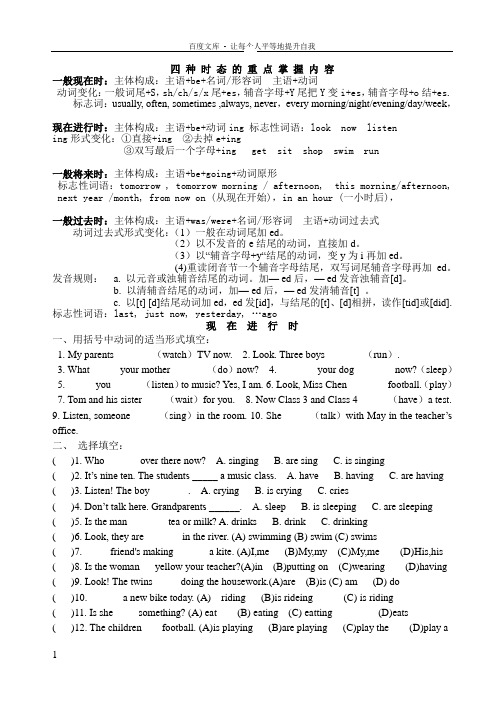
四种时态的重点掌握内容一般现在时:主体构成:主语+be+名词/形容词主语+动词动词变化:一般词尾+S,sh/ch/s/x尾+es,辅音字母+Y尾把Y变i+es,辅音字母+o结+es.标志词:usually, often, sometimes ,always, never,every morning/night/evening/day/week,现在进行时:主体构成:主语+be+动词ing 标志性词语:look now listening形式变化:①直接+ing ②去掉e+ing③双写最后一个字母+ing get sit shop swim run一般将来时:主体构成:主语+be+going+动词原形标志性词语:tomorrow , tomorrow morning / afternoon, this morning/afternoon, next year /month, from now on (从现在开始),in an hour (一小时后),一般过去时:主体构成:主语+was/were+名词/形容词主语+动词过去式动词过去式形式变化:(1)一般在动词尾加ed。
(2)以不发音的e结尾的动词,直接加d。
(3)以“辅音字母+y“结尾的动词,变y为i再加ed。
(4)重读闭音节一个辅音字母结尾,双写词尾辅音字母再加ed。
发音规则: a. 以元音或浊辅音结尾的动词。
加— ed后,— ed发音浊辅音[d]。
b. 以清辅音结尾的动词,加— ed后,— ed发清辅音[t] 。
c. 以[t] [d]结尾动词加ed,ed发[id],与结尾的[t]、[d]相拼,读作[tid]或[did]. 标志性词语:last, just now, yesterday, …ago现在进行时一、用括号中动词的适当形式填空:1. My parents _______(watch)TV now.2. Look. Three boys _______(run).3. What _____ your mother _______(do)now?4. _______ your dog _______ now?(sleep)5. _____ you ______(listen)to music? Yes, I am.6. Look, Miss Chen _______ football.(play)7. Tom and his sister ____(wait)for you.8. Now Class 3 and Class 4______(have)a test.9. Listen, someone _____(sing)in the room. 10. She _____(talk)with May in the teacher’s office.二、选择填空:( )1. Who ______ over there now? A. singing B. are sing C. is singing( )2. It’s nine ten. The students _____ a music class. A. have B. having C. are having ( )3. Listen! The boy _______. A. crying B. is crying C. cries( )4. Do n’t talk here. Grandparents ______. A. sleep B. is sleeping C. are sleeping ( )5. Is the man _______ tea or milk? A. drinks B. drink C. drinking( )6. Look, they are _______in the river. (A) swimming (B) swim (C) swims( )7. _____friend's making ______ a kite. (A)I,me (B)My,my (C)My,me (D)His,his ( )8. Is the woman __ yellow your teacher?(A)in (B)putting on (C)wearing (D)having ( )9. Look! The twins_____ doing the housework.(A)are (B)is (C) am (D) do( )10. _____a new bike today. (A) riding (B)is rideing (C) is riding( )11. Is she ____ something? (A) eat (B) eating (C) eatting (D)eats( )12. The children____football. (A)is playing (B)are playing (C)play the (D)play a( )13. They ____ TV in the evening. (A)are watching (B)can't watching (C)don't watch ( )14. They are _____ their clothes.(A)makeing (B)putting (C)put away (D)putting on ( ) 15. Listen! She ____ in the classroom. (A)is singing (B)sing (C)to sing (D)is sing 三、按要求进行句型转换:! Lily is dancing.(改一般疑问句)_________________________________________2. Kate is looking for her watch.(改否定句)________________________________________3. Mrs. White is watching TV.(划线提问)_________________________________________4. I am doing homework.(改否定句)__________________________________________5. They are waiting for you at the library.(划线提问)_____________________________一般将来时一、选择题( ) ____ a meeting tomorrow. A. is going to be B. will go to be( ) next month. A. won’t work B. working C. isn’t going to working( )3. He ___ busy this week A. will be B. is; C. will be; D. is( ) ____a football match tomorrow. A. was B. is going to have C. will have( )5. ____ you ___ free tomorrow? Are; going to B. Are; going to be C. Are; going to( )6. Mother ___ me a present on my next birthday. A. will gives B. will give C. gives ( )7. He _____ her a hat on her next birthday. A. gives B. will giving D. is going to give ( )8. He _____ to us as soon as he gets there. A. writes B. has written C. will write( )9. He _____ in three days. A. came back B. will come back C. is going to coming back ( ) ____the work this way next time. A. do B. will do C. going to do D. will doing( ) he ____a kite in the park. A. will flys; B. will flying C. is going to fly;( ) they ___a volleyball match. A. will watching B. watches C. is watching( ) _____ a party tomorrow. having going to have having( )14. ___ you ____free next Sunday? A. Will; are B. Will; be C. Do; be D. Are; be ( )15. He ________ there at ten tomorrow morning. A. will B. is C. will be D. be二句型转换1. Nancy is going to go camping.(改否定)Nancy ________ going to go camping.2. I’ll go and join them.(改否定)I _______ go ______ join them.3. I’m going to get up at 6:30 tomorrow.(改一般疑问句)________ _______ ________ to get up at 6:30 tomorrow?4. We will meet at the bus stop at 10:30.(改一般疑问句)_______ ________ meet at the bus stop at 10:30.5. She is going to listen to music after school.(对划线部分提问)________ _______ she ________ ________ _________ after school?6. My father and mother are going to see a play the day after tomorrow.(同上)_________ _________ going to see a play the day after tomorrow.7. Today is a sunny day. We _______ (have) a picnic this afternoon.8. My brother _____(go) to Shanghai next week.9. Tom often _____ (go) to school on foot. But today is rain. He ______(go) to school by bike.10. What do you usually do at weekends? I usually____(watch) TV and ______(catch) insects?11. What ________(do) you do last Sunday? What _______(do) next Sunday?12. Mary _____ (visit) her grandparents tomorrow一般现在时一. 用所给动词的适当形式填空:1.Mike__________ (like) cooking. 2. She__________ (go) to school from Monday to Friday.3. He often_______ (have) dinner at home.4. Daniel and Tommy _______ (be) in Class One.5. There_____ (be) some water in the bottle.6. Don’t make a noise. Gr andpa __________(sleep).7. It’s seven now, Tom’s family__________(watch) TV.8. It ________(take) me two hours to finish my homework last night.9. She often_______(wash) clothes in the evening.10. She______ (don’t do) homework every day. 11. The girl______ (teach) English on Sundays.12. There ________ (be) a football match on TV this evening.13. Your parents__________ (read) newspapers every day.14. What they often__________ (do) on Saturdays? 15. We ______ (not watch) TV on Monday.16. they__________ (like) the World Cup. 17. Nick________ (not go) to the zoo on Sunday.18. Liu Tao__________ (do) not like PE.19. Jenny and Danny usually______(play) games in the afternoon .二.单项选择:1. Jenny____ English every evening. A has study B studies C study D studied2. Wang Mei ____ music and often ____ to music. A like; listen B likes; listens C like; are listening D liking ; listen3. The picture _______ nice. A. looks B. is looked C. look D. is looking4. He ______ a good friend. A. having B. have C. to have D. has5. One of the boys_____ a black hat. A have B there is C there are D has三、按照要求改写句子1. Daniel watches TV every evening.(改否定句) ______________________________________2. I do my homework every day.(改一般疑问句) ________________________________3. She likes milk.(改为一般疑问句) ____________________________________________4. Amy likes playing computer games.(改一般疑问句)________________________________5. We go to school every morning.(改否定句)_____________________________________6. He speaks English very well.(改否定句)________________________________________7. I like taking photos in the park.(划线提问)_________________________________________8. John comes from Canada.(划线提问)_____________________________________________9. She is a good student.(改一般疑问句否定回答)____________________________________10. Simon and Daniel like going skating.(否定句)___________________________________一般过去时一、用动词的适当形式填空。
pep小学英语四个时态及其练习打印

小学英语四种时态及练习一、一般现在时1. 意义:表示习惯或者爱好。
如:I get up at six every day. I like draw ing pictures. 2. 结构:I am a boy.我是一个男孩。
We study En glish.我们学习英语。
注意:当主语为第三人称单数(he, she,it,Mike) "-es"。
女口: Mary likes Chinese. 玛丽喜欢汉语。
3. 时间标志:usually ,ofen, sometimes, always, everyday, on Sun days4. 动词+s 的变化规则1) 一般情况下,直接加-s ,如:cook-cooks, milk-milks2) 以 s. x. sh. ch. o 结尾,力卩-es ,女口: wash-washes, watch-watches, go-goes 3) 以“辅音字母+y ”结尾,变y 为i,再加-es ,如:study-studies练习一般现在时用法专练: 一、写出下列动词的第三人称单数二、用括号内动词的适当形式填空。
1. He ofte n _has _____ (have) dinner at home.2. Dan iel and Tommy _are ____ (be) in Class One.3. We _dont_watch ___ (not watch) TV on Mon day.4. Nick _doesn't _ go __ (not go) to the zoo on Sun day.5. __Do __ they _____ like ___ (like) the World Cup?6. What __do ___ they often ___ do ___ (do) on Saturdays?7. __ Do ____your pare nts __read ____ (read) n ewspapers every day?8. The girl _____ (teaches) us En glish on Sun days.9. She and I ____ take ___ (take) a walk together every eve ning. 10. There ___is ___ (be) some water in the bottle. 11. Mike _______ (likes) cook in g.12. They _______ (have) the same hobby.13. My aunt ______ (looks) after her baby carefully. 14. You always _______ (do) your homework well. 15. I __ a ____ (be) ill. I ' m staying in bed. 16. She ___ goes __ (go) to school from Mon day to Friday.我每天六点起床。
小学英语四大时态总结及练习题
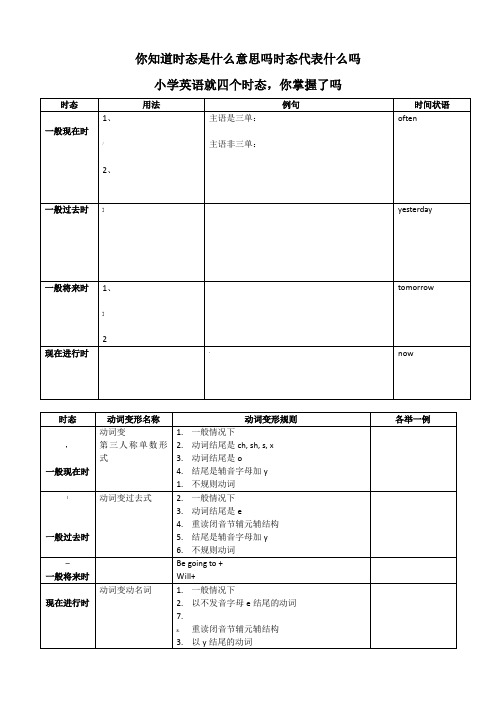
你知道时态是什么意思吗时态代表什么吗小学英语就四个时态,你掌握了吗你能发现它们之间的共同点和不同点吗勤加练习,百战不殆I.把下列动词变为第三人称单数形式。
1. clean--2. go--3. have--4.do-6. fly--7. come-- brush-9. watch-- 10. study-- 11. ask--(13. swim-- 14. catch-- 15. write--16. eat-- 17. make-- 18. paint—19. learn-- 20. phone-- 21. run—22. hop-- 23. sing-- 24. pick—II.把下列动词变成过去式is\am________ fly______ plant________are________ drink_________ play_______go________ make ______ does_________dance________ worry________ ask _____ taste_________ eat__________ draw________put ______ throw________kick_________ pass_______ do ________III.把下列动词变成动名词形式。
Wake________ make__________ come____________have____________!Take_________ leave__________ rid_________, regret__________, Begin________,cut________, get_________, hit_________, run_________, set_________, sit__________, spit__________, stop_________, swim________,beg_________, drop__________, fit_________, nod_________, dig___________, forget_________, travel_________visit_________Carry_________ enjoy___________ play ___________ study ________die_________ lie_________多加练习,百战不殆之时态篇一、用单词的正确形式填空:1.Mike _________ (do) his homework every day.2.There __________(be) some water in the glass.3.We like ________ (play) basketball after class.4.I like singing. I often _________(listen) to the music in the evening.5.【6.My grandma_________(watch) TV every day.二、判断句子的正误, 并改正。
(完整版)PEP小学英语四种时态练习题及答案
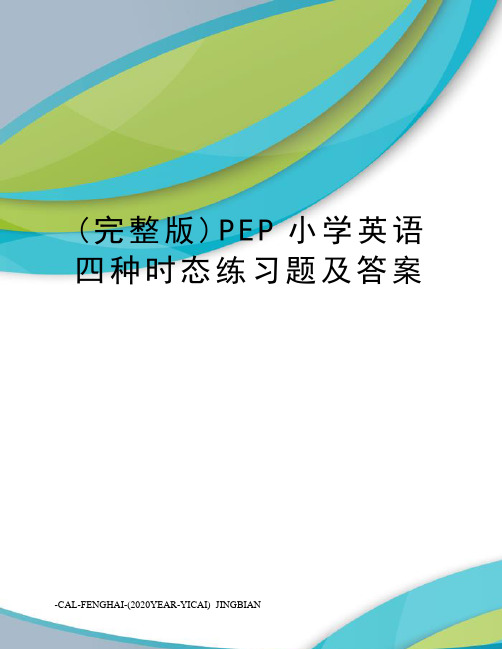
(完整版)P E P小学英语四种时态练习题及答案-CAL-FENGHAI-(2020YEAR-YICAI)_JINGBIAN一般现在时练习题一、写出下列动词的第三人称单数形式。
eat read do take washwatch have carry study f lycatch go have cook looksing teach like get come play二、用单词的正确形式填空:1.Mike ___________ (do) his homework every day.2. There ____________ (be) some water in the glass.3.We like ____________ (play) basketball after class.4.I like singing. I often ____________ (listen) to the music in the evening.5.My grandma ___________ (watch) TV every day.三、选择最佳的答案:1. ____Alice often play the piano. No, she _____.A. Do; doB. Does; doesC. Does; doesn't2. ___ your penfriend __ in BeijingA. Do; liveB. Do; livesC. Does; live3. Tom and Mike __ very excited, they will take a trip.A. isB. areC. am4. I like ________ very much. What about you?A. danceB. dancedC. dancing5. I can’t find my pen. Let me __.A. go and ask herB. go and ask hersC. go and ask she6. Fangfang is a good student. She ____maths.A. does good atB. well do itC. is good at7. The kite ____ a bird. A. look like B. is looking C. looks like8. Bill and I ___ good friends.A. isB. areC. am9. Sandy often ___ his homework on Sundays .A. doB. doesC. did10. What do you usually do on the weekend I __________.A. went swimmingB. go swimmingC. visited grandparents11. What do you usually do on your holiday?A. saw elephantsB. sing and danceC.took picture12. I ____ a student. I go to school ____bus every day.A. is; byB. am; onC. am; by13. I ____ a brother. She ____ a sister.A. have; hasB. has; hasC. have; have14. You ____ a student. He ____ a teacher.A. is; isB. are; isC. are; are15. He always _____ football games.A. watchesB. watchC. doesn't16. My best friend _____ shells.A. collectsB. collectC. often17. She doesn’t _____ listening to the music.A. oftenB. likeC. likes18. My mother and I ___ always watch romantic films.A. doesn’tB. don’tC. do19. ---When _____ he get home on Friday?----He gets home at four on Friday. A. do B. does C. did现在进行时练习题一、写出下列单词的现在分词:do play dance sitmake swim jump cookclean watch come readeat write sing gorun fly catch help二、用单词的适当形式填空:1. look! Chen Jie and Mike are ___________(sing)now.2. The small bear is ________ (climb) the tree.3. Mike is ________ (draw) picture.4. She is ________ (do) the dishes.5. My brother is ________ (make) kites.6. My father is ________ (read) a newspaper in living room.7. Ted is __________(answer) the phone.8. My uncle is ________ (drive) a car.9. The students are ________(listen) to their teacher carefully.10. Chen Jie is _________(wash) clothes.三、选择正确答案1. Every one ____ to their teacher in the classroom.A. are listeningB. is listeningC. listen2. They are singing and ___ together at the party now.A. danceB. dancedC. dancing3. Listen! The birds ____.A. is singingB. are singC. are singing4. Look! The kite ___ in the sky. A. fly B. flies C. is flying5. They ____ riding a forse. A. is B. are C. am6. Kate ____ playing chess. A. am B. is C. are7. Are you washing clothesA. Yes, you areB. Yes, I amC. No, I am8. Is he ____ TV?Yes, he is. A. watch B. watching C. not9. ____ they taking pictures. Yes, they are.A. AmB. BeC. Are10. It’s 10 o’clock. Ben _____ TV in the bedroom.A. watchB. is watchingC. watches四、根据中文填空。
四种时态及其练习(完整版)
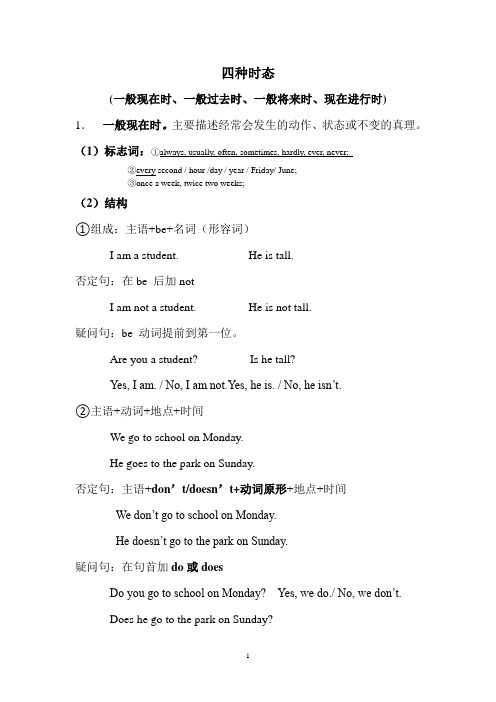
四种时态(一般现在时、一般过去时、一般将来时、现在进行时)1.一般现在时。
主要描述经常会发生的动作、状态或不变的真理。
(1)标志词:①always, usually, often, sometimes, hardly, ever, never;②every second / hour /day / year / Friday/ June;③once a week, twice two weeks;(2)结构①组成:主语+be+名词(形容词)I am a student. He is tall.否定句:在be 后加notI am not a student. He is not tall.疑问句:be 动词提前到第一位。
Are you a student? Is he tall?Yes, I am. / No, I am not.Yes, he is. / No, he isn’t.②主语+动词+地点+时间We go to school on Monday.He goes to the park on Sunday.否定句:主语+don’t/doesn’t+动词原形+地点+时间We don’t go to school on Monday.He doesn’t go to the park on Sunday.疑问句:在句首加do或doesDo you go to school on Monday? Yes, we do./ No, we don’t.Does he go to the park on Sunday?Yes, he does./ No, he doesn’t.(3)动词三单变化:①在原单词末尾加s , 如:like –likes②单词以o, sh, ch, s, x 结尾加es, 如:go –goes③单词末尾为辅音+y结尾去y加ies 如:study- studies2. 现在进行时:主要叙述正在发生的事情。
PEP版小学英语四种时态复习
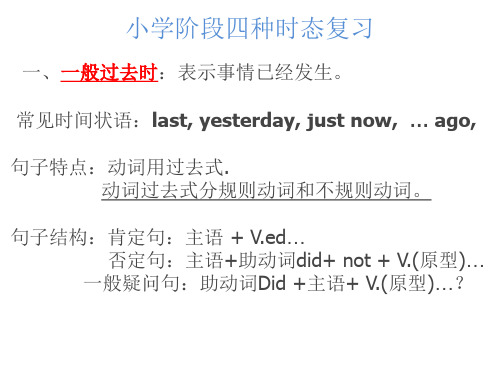
be动词用过去式:am,is—was; are—were 句子结构: 肯定句:主语 + was/were… 否定句:主语 + was/were +not +… 一般疑问句:was/were+主语+…?
Eg 1. I was a student some years ago. I wasn’t a student some years ago. 否定:__________________________ Was I a student some years ago? 一般疑问句:________________________
小学阶段四种时态复习
一、一般过去时:表示事情已经发生。
常见时间状语:last, yesterday, just now, … ago,
句子特点:动词用过去式. 动词过去式分规则动词和不规则动词。 句子结构:肯定句:主语 + V.ed… 否定句:主语+助动词did+ not + V.(原型)… 一般疑问句:助动词Did +主语+ V.(原型)…?
eg:1. I am going to play football this afternoon. I am not going to play football this afternoon. 否定:__________________________
Am I going to play football this afternoon? 一般疑问句:______________________
2. They all went to the mountains yesterday morning. all didn’t go to the mountains yesterday morning. 否定:They __________________________
(完整版)四种时态及其练习(完整版)
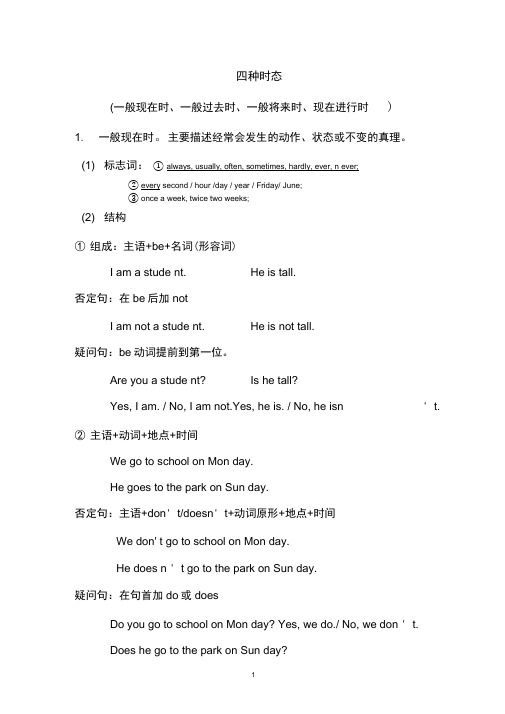
四种时态(一般现在时、一般过去时、一般将来时、现在进行时)1. 一般现在时。
主要描述经常会发生的动作、状态或不变的真理。
(1) 标志词:① always, usually, often, sometimes, hardly, ever, n ever;②every second / hour /day / year / Friday/ June;③once a week, twice two weeks;(2) 结构①组成:主语+be+名词(形容词)I am a stude nt. He is tall.否定句:在be后加notI am not a stude nt. He is not tall.疑问句:be动词提前到第一位。
Are you a stude nt? Is he tall?Yes, I am. / No, I am not.Yes, he is. / No, he isn ' t.②主语+动词+地点+时间We go to school on Mon day.He goes to the park on Sun day.否定句:主语+don' t/doesn' t+动词原形+地点+时间We don' t go to school on Mon day.He does n ' t go to the park on Sun day.疑问句:在句首加do或doesDo you go to school on Mon day? Yes, we do./ No, we don ' t.Does he go to the park on Sun day?Yes, he does./ No, he does n (3) 动词三单变化:① 在原单词末尾加s ,如:like - likes② 单词以 o, sh, ch, s, x 结尾力口 es,女口: go - goes ③ 单词末尾为辅音+y 结尾去y 加ies 女口: study- studies 2.现在进行时:主要叙述正在发生的事情。
四大时态按要求完成句子训练(讲义)人教PEP版英语六年级下册
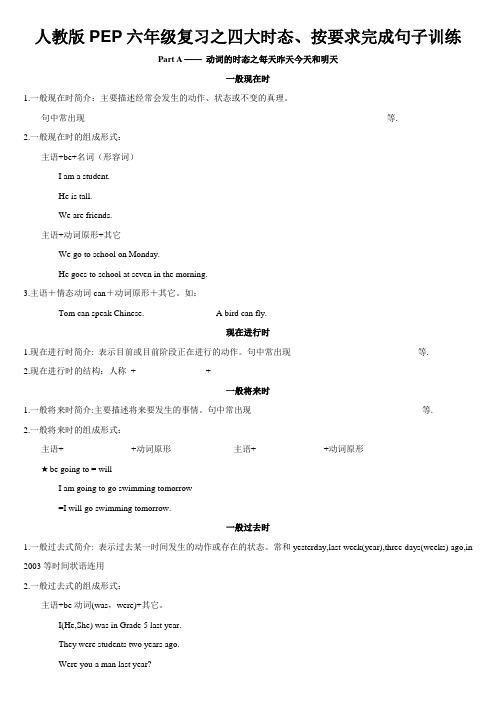
人教版PEP六年级复习之四大时态、按要求完成句子训练Part A ——动词的时态之每天昨天今天和明天一般现在时1.一般现在时简介:主要描述经常会发生的动作、状态或不变的真理。
句中常出现____________________________________________________________________等.2.一般现在时的组成形式:主语+be+名词(形容词)I am a student.He is tall.We are friends.主语+动词原形+其它We go to school on Monday.He goes to school at seven in the morning.3.主语+情态动词can+动词原形+其它。
如:Tom can speak Chinese. A bird can fly.现在进行时1.现在进行时简介: 表示目前或目前阶段正在进行的动作。
句中常出现____________________________等.2.现在进行时的结构:人称+ _______________ + _______________一般将来时1.一般将来时简介:主要描述将来要发生的事情。
句中常出现______________________________________等.2.一般将来时的组成形式:主语+ _______________+动词原形主语+ _______________+动词原形★be going to = willI am going to go swimming tomorrow=I will go swimming tomorrow.一般过去时1.一般过去式简介: 表示过去某一时间发生的动作或存在的状态。
常和yesterday,last week(year),three days(weeks) ago,in 2003等时间状语连用2.一般过去式的组成形式:主语+be动词(was,were)+其它。
小学四种时态试题及答案

小学四种时态试题及答案一、一般现在时1. 我每天上学。
A. go to schoolB. goes to schoolC. am going to schoolD. am going to go to school答案:A2. 他经常帮助别人。
A. He often help others.B. He often helps others.C. He often helped others.D. He often helping others.答案:B3. 我们喜欢游泳。
A. We like to swim.B. We likes to swim.C. We liked to swim.D. We liking to swim.答案:A二、一般过去时4. 昨天我去了图书馆。
A. I go to the library yesterday.B. I went to the library yesterday.C. I am going to the library yesterday.D. I go to the library yesterday.答案:B5. 他们上周看了电影。
A. They watch a movie last week.B. They watched a movie last week.C. They are watching a movie last week.D. They will watch a movie last week.答案:B6. 她昨天买了一本书。
A. She buy a book yesterday.B. She bought a book yesterday.C. She is buying a book yesterday.D. She will buy a book yesterday.答案:B三、一般将来时7. 明天我要去看医生。
A. I am going to see a doctor tomorrow.B. I go to see a doctor tomorrow.C. I went to see a doctor tomorrow.D. I will go to see a doctor tomorrow.答案:A8. 他们将要参加比赛。
小学英语四种时态知识点加练习题.docx
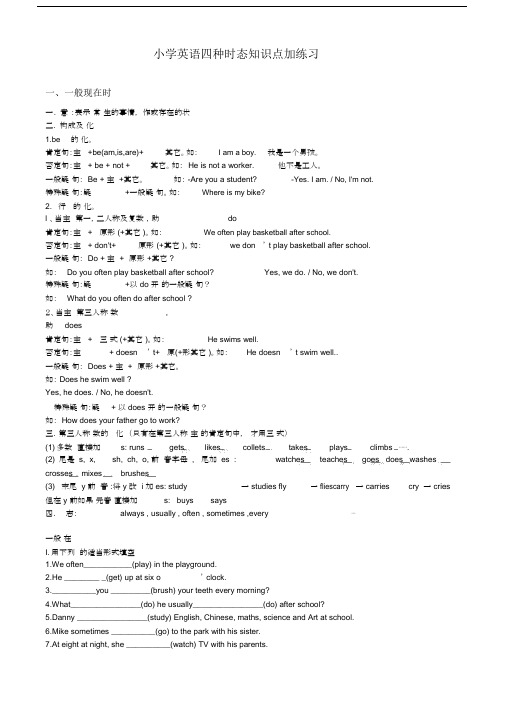
如:Does he swim well ?
Yes, he does. / No, he doesn't.
特殊疑 句:疑+以does开 的一般疑 句?
如:How does your father go to work?
三.第三人称 数的 化 (只有在第三人称 主 的肯定句中, 才用三 式)
动作。结构:助动词be ( am / is / are ) +现在分词.
二、现在分词的构成:
1.大多数动词后可在动词后直接加-ing.
Eg: carry-carrying,catch-catching,drink-drinking, enjoy-enjoying hurry-hurrying,do-doing ,
小学英语四种时态知识点加练习
一、一般现在时
一.意 :表示 常 生的事情, 作或存在的状
二.构成及 化
1.be
的 化。
肯定句:主+be(am,is,are)+其它。如:I am a boy.
否定句:主+ be + not +其它。如:He is not a worker.
一般疑 句:Be +主+其它。如:-Are you a student?
否定句:主+ don't+原形(+其它)。如:we don’t play basketball after school.
一般疑 句:Do +主+原形+其它?
如:Do you often play basketball after school?Yes, we do. / No, we don't.
完整版)小学英语四大时态总结及练习题
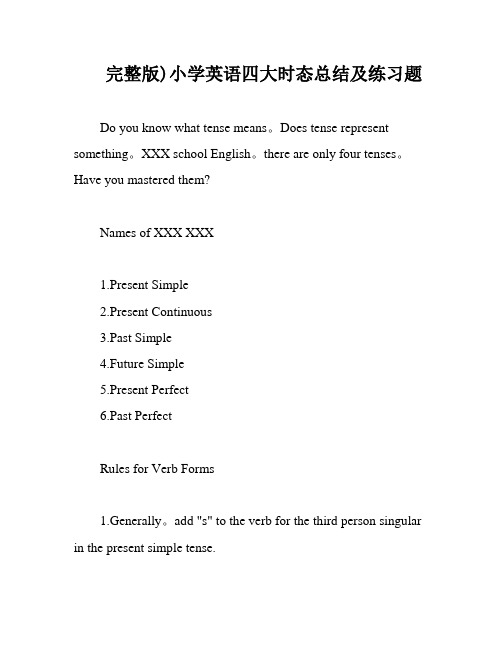
完整版)小学英语四大时态总结及练习题Do you know what tense means。
Does tense represent something。
XXX school English。
there are only four tenses。
Have you mastered them?Names of XXX XXX1.Present Simple2.Present Continuous3.Past Simple4.Future Simple5.Present Perfect6.Past PerfectRules for Verb Forms1.Generally。
add "s" to the verb for the third person singular in the present simple tense.2.For verbs ending in ch。
sh。
s。
or x。
add "es" to the verb for the third person singular in the present simple tense.3.For verbs ending in o。
add "es" to the verb for the third person singular in the present simple tense.4.For verbs XXX "y," change the "y" to "i" and add "es" to the verb for the third person singular in the present simple tense.5.For irregular verbs。
there is no specific rule.6.Generally。
小学英语四大时态总结及练习题
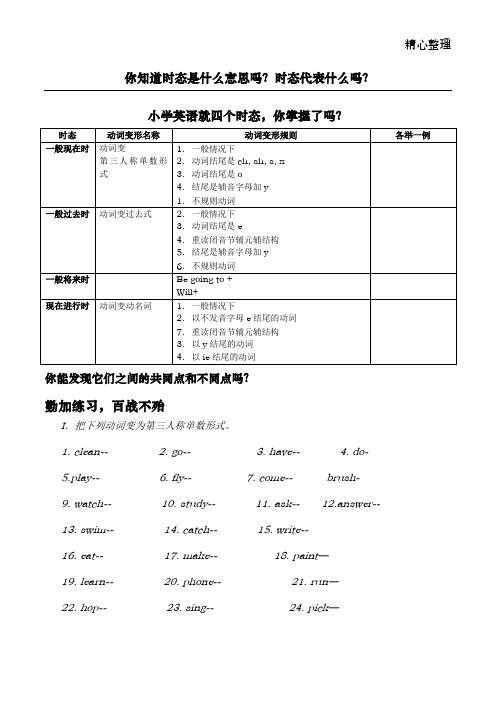
精心整理你知道时态是什么意思吗?时态代表什么吗?小学英语就四个时态,你掌握了吗?时态动词变形名称动词变形规则各举一例一般现在时动词变第三人称单数形式1.一般情况下2.动词结尾是ch, sh, s, x3.动词结尾是o4.结尾是辅音字母加y 1.不规则动词一般过去时动词变过去式 2.一般情况下3.动词结尾是e4.重读闭音节辅元辅结构5.结尾是辅音字母加y6.不规则动词一般将来时Be going to +Will+现在进行时动词变动名词 1.一般情况下2.以不发音字母e结尾的动词7.重读闭音节辅元辅结构3.以y结尾的动词4.以ie结尾的动词你能发现它们之间的共同点和不同点吗?勤加练习,百战不殆I.把下列动词变为第三人称单数形式。
1. clean--2. go--3. have--4. do-5.play--6. fly--7. come-- brush-9. watch-- 10. study-- 11. ask-- 12.answer--13. swim-- 14. catch-- 15. write--16. eat-- 17. make-- 18. paint—19. learn-- 20. phone-- 21. run—22. hop-- 23. sing-- 24. pick—II.把下列动词变成过去式is\am________ fly______ plant_____ are________ drink_________play_______ go________ make ______ do_________dance________ worry_____ask _____ taste_________ eat________draw________ put ______ throw________ kick_________pass_______ do ________III.把下列动词变成动名词形式。
小学英语四大时态总结(附小升初时态考题)

4. 以o结尾的单词: 有生命加s 。
tomato-tomatoespotato-potatoes无生命加espiano-pianosphoto-photoszoo-zoosradio-radios小升初时态专题综合训练1.(成都市青羊区小学毕业卷)John _____ football.A. likes playingB. likes playC. like play2.(深圳市龙岗区小学毕业卷)Does your mother _____ football?A. likeB. likesC. like play3.(芜湖市第三中学招生卷)They usually _____ TV in the evening.A. watchB. will watchC. are watchingD. watches4.(上海市奉贤区小学毕业卷)—What do you usually do on the weekend?—I often ____.A. do my homeworkB. did my homeworkC. doing my homework5. (杭州市西湖区小学毕业卷)I don’t like _____ thril lers(恐怖片)______ playing baseball.A. watching; orB. watching; andC. to watch; or6.(菏泽市晨曦中学招生卷)Bob often _____ to school.A. walkB. walksC. walked7.(南昌铁路一中初中部招生卷)My pen ______ on my desk ten minutes ago.But it _____ there now.A. is; isn’tB. was; isn’tC. is; is8.(长沙市宁乡县小学毕业卷)Mike is _____ after his classmates.A. runsB. runingC. running9.(桂林市奎光学校招生卷)Be quiet! The babies ________.A. sleepB. are sleepingC. slept10. (武汉市青山区小学毕业卷)______ he _____ his homework yesterday?A. Does; doB. Did; didC. Did; do11(北京市朝阳区小学毕业卷)—What did you do last weekend?—I ______.A. go swimmingB. did my homeworkC. went swim12.(芜湖市第十一中学招生卷)—What’s your hobby?—_____ is my hobby.A. Collecting stampsB. Collect stampsC. Stamps13.(广州市白云区小学毕业卷)—Where were you just now?—I _____ at school.A. isB. wasC. were14.(武汉市青山区小学毕业卷)______ he ______ his grandparents lastmonth?A. Did; visitedB. Did; visitC. Do; visited15.(郑州市二七区小学毕业卷)Last week, we _____ a _____ race.A. hard; runningB. have; runningC. had; running16.(福州市仓山区小学毕业卷)I______ to the park last week.A. goB. wentC. going17.(合肥市蜀山区小学毕业卷)If I _____ you tomorrow, I will give youthe receipt(收据)。
PEP小学英语小升初英语四大时态练习
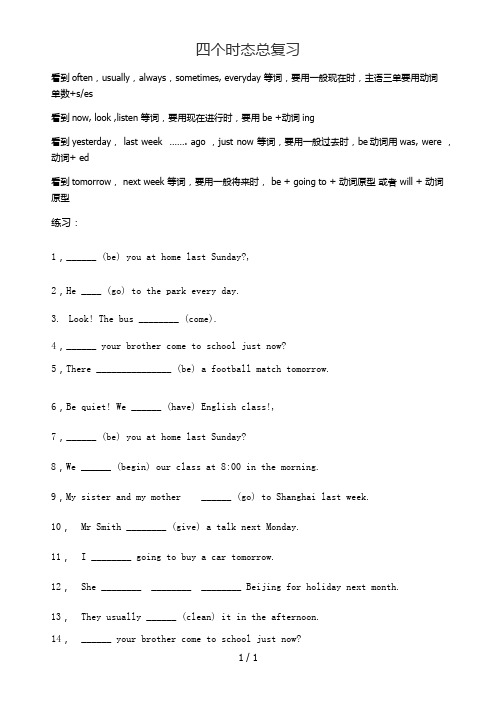
四个时态总复习看到often,usually,always,sometimes, everyday 等词,要用一般现在时,主语三单要用动词单数+s/es看到now, look ,listen 等词,要用现在进行时,要用be +动词ing看到yesterday, last week ……. ago ,just now 等词,要用一般过去时,be动词用was, were ,动词+ ed看到tomorrow, next week 等词,要用一般将来时, be + going to + 动词原型或者 will + 动词原型练习:1,______ (be) you at home last Sunday?,2,He ____ (go) to the park every day.3.Look! The bus ________ (come).4,______ your brother come to school just now?5,There _______________ (be) a football match tomorrow.6,Be quiet! We ______ (have) English class!,7,______ (be) you at home last Sunday?8,We ______ (begin) our class at 8:00 in the morning.9,My sister and my mother ______ (go) to Shanghai last week.10,Mr Smith ________ (give) a talk next Monday.11,I ________ going to buy a car tomorrow.12,She ________ ________ ________ Beijing for holiday next month.13,They usually ______ (clean) it in the afternoon.14,______ your brother come to school just now?1 / 1。
四种时态及其练习(完整版)

四种时态(一般现在时、一般过去时、一般将来时、现在进行时)1.一般现在时。
主要描述经常会发生的动作、状态或不变的真理。
(1)标志词:①always, usually, often, sometimes, hardly, ever, never;②every second / hour /day / year / Friday/ June;③once a week, twice two weeks;(2)结构①组成:主语+be+名词(形容词)I am a student. He is tall.否定句:在be 后加notI am not a student. He is not tall.疑问句:be 动词提前到第一位。
Are you a student Is he tallYes, I am. / No, I am , he is. / No, he isn’t.②主语+动词+地点+时间We go to school on Monday.He goes to the park on Sunday.否定句:主语+don’t/doesn’t+动词原形+地点+时间We don’t go to school on Monday.He doesn’t go to the park on Sunday.疑问句:在句首加do或doesDo you go to school on Monday Yes, we do./ No, we don’t.Does he go to the park on SundayYes, he does./ No, he doesn’t.(3)动词三单变化:①在原单词末尾加s , 如:like – likes②单词以o, sh, ch, s, x 结尾加es, 如:go – goes③单词末尾为辅音+y结尾去y加ies 如:study- studies2. 现在进行时:主要叙述正在发生的事情。
- 1、下载文档前请自行甄别文档内容的完整性,平台不提供额外的编辑、内容补充、找答案等附加服务。
- 2、"仅部分预览"的文档,不可在线预览部分如存在完整性等问题,可反馈申请退款(可完整预览的文档不适用该条件!)。
- 3、如文档侵犯您的权益,请联系客服反馈,我们会尽快为您处理(人工客服工作时间:9:00-18:30)。
小学英语四种时态及练习一、名词复数规则1.一般情况下,直接加-s,如:book-books, bag-bags, cat-cats, bed-beds 2.以s. x. sh. ch结尾,加-es,如:bus-buses, box-boxes, brush-brushes, watch-watches3.以“辅音字母+y”结尾,变y为i, 再加-es,如:family-families,strawberry-strawberries4.以“f或fe”结尾,变f或fe为v, 再加-es,如:knife-knives5.不规则名词复数:man-men, woman-women, policeman-policemen, policewoman-policewomen, mouse-mice child-children foot-feet, tooth-teethfish-fish, people-people, Chinese-Chinese, Japanese-Japanese练习:写出下列各词的复数I _________him _________this ___________her ______watch _______child _______photo ________diary ______day________ foot________ book_______ dress ________tooth_______ sheep ______box_______ strawberry _____thief _______yo-yo ______ peach______ sandwich ______man______ woman_______ paper_______ juice___________water________ milk________ rice__________ tea__________二、一般现在时1.意义:表示习惯或者爱好。
如:I get up at six every day.我每天六点起床。
I like drawing pictures.我喜欢画画。
2.结构:I am a boy.我是一个男孩。
We study English.我们学习英语。
注意:当主语为第三人称单数(he, she,it,Mike)时,要在动词后加"-s"或"-es"。
如:Mary likes Chinese.玛丽喜欢汉语。
3.时间标志:usually,ofen, sometimes, always, everyday, on Sundays4.动词+s的变化规则1)一般情况下,直接加-s,如:cook-cooks, milk-milks2)以s. x. sh. ch. o结尾,加-es,如: wash-washes, watch-watches, go-goes3)以“辅音字母+y”结尾,变y为i, 再加-es,如:study-studies练习一、写出下列动词的第三人称单数drink ________ go _______ stay ________ make ________look _________ have_______ pass_______ carry ____come________ watch______ plant_______ fly ________study_______ brush________ do_________ teach_______二、用括号内动词的适当形式填空。
1. He often ________(have) dinner at home.2. Daniel and Tommy _______(be) in Class One.3. We _______(not watch) TV on Monday.4. Nick _______(not go) to the zoo on Sunday.5. ______ they ________(like) the World Cup?6. What _______they often _______(do) on Saturdays?7. _______ your parents _______(read) newspapers every day?8. The girl _______(teach) us English on Sundays.9. She and I ________(take) a walk together every evening.10. There ________(be) some water in the bottle.11. Mike _______(like) cooking.12. They _______(have) the same hobby.13. My aunt _______(look) after her baby carefully.14. You always _______(do) your homework well.15. I _______(be) ill. I’m staying in bed.16. She _______(go) to school from Monday to Friday.17. Liu Tao _______(do) not like PE.18. The child often _______(watch) TV in the evening.19. Su Hai and Su Yang _______(have) eight lessons this term.20. -What day _______(be) it today?-It’s Saturday.三、按照要求改写句子1. Daniel watches TV every evening.(改为否定句)___________________________________________________2. I do my homework every day.(改为一般疑问句,作否定回答)________________________________________________________3. She likes milk.(改为一般疑问句,作肯定回答)___________________________4. Amy likes playing computer games.(改为一般疑问句,作否定回答) ___________________________________________________5. We go to school every morning.(改为否定句)_______________________________________________________6. He speaks English very well.(改为否定句)___________________________________________________7. I like taking photos in the park.(对划线部分提问)________________________________________________________8. John comes from Canada.(对划线部分提问)___________________________________________________9. She is always a good student.(改为一般疑问句,作否定回答)________________________________________________________10. Simon and Daniel like going skating.(改为否定句)___________________________________________________五、改错(划出错误的地方,将正确的写在横线上)1. Is your brother speak English? __________________2. Does he likes going fishing? __________________3. He likes play games after class. __________________4. Mr. Wu teachs us English. __________________5. She don’t do her homework on Sundays. _________________三、现在进行时1.意义:现在进行时表示现在正在进行或发生的动作。
2.结构:主语+be+动词ing.3.时间标志:now, listen, look动词加ing的变化规则1.一般情况下,直接加ing,如:cook-cooking2.以不发音的e结尾,去e加ing,如:make-making, taste-tasting3.如果末尾是一个元音字母和一个辅音字母,双写末尾的辅音字母,再加ing,如:run-running, stop-stopping一、写出下列动词的现在分词:play________ run__________ swim _________make__________go_________ like________ write________ _ski___________read________ have_________ sing ________ dance_________put_________ see________ buy _________ love____________live_______ take_________ come ________ get_________stop_________ sit ________ begin________ shop___________二、用所给的动词的正确形式填空:1.The boy __________________ ( draw)a picture now.2. Listen .Some girls _______________ ( sing)in the classroom .3. My mother _________________ ( cook )some nice food now.4. What _____ you ______ ( do ) now?5. Look . They _______________( have) an English lesson .6.They ____________(not ,water) the flowers now.7.Look! the girls ________________(dance )in the classroom .8.What is our granddaughter doing? She _________(listen ) to music.9. It’s 5 o’clock now. W e _____________(have)supper now10.______Helen____________(wash )clothes? Yes ,she is .三、句型转换:1. They are doing housework .(分别改成一般疑问句和否定句)__________________________________________________________________________________________________________________________2.The students are cleaning the classroom . ( 改一般疑问句并作肯定和否定回答)__________________________________________________________________________________________________________________________________ 3.I’m playing the football in the playground .(对划线部分进行提问) _________________________________________________________________ 4.Tom is reading books in his study . (对划线部分进行提问)_________________________________________________________________四、一般将来时1.意义:表示将要发生的动作或存在的状态及打算、计划或准备做某事。
